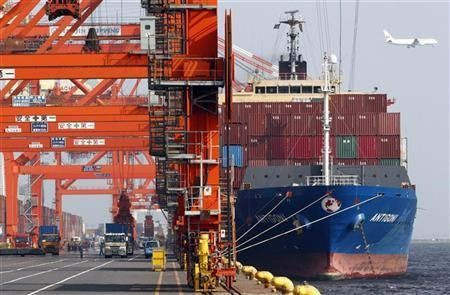Japan Trade Deficit Up on Aftershocks from Earthquake

Japan reported a record-high balance of trade deficit in January as last year's tsunami combined with floods in Thailand, Europe's sovereign debt crisis, slowing Chinese growth and a soaring yen to leave the world's third-largest economy with its first trade deficit since the last century.
Japanese imports last month exceeded exports by ¥1.48 trillion ($18.56 billion), the Ministry of Finance said Monday.
Exports fell 9.3 percent because of the disruption of supply-chain processes due to Thai floods, slower growth in China's economy and a weakening euro that made Japanese products more expensive. Imports fell 9.8 percent because of increased demand for energy imports in a country whose nuclear power production levels have yet to recover from the devastating tsunami and earthquakes experienced last spring.
Prior to 2011, Japan had not run a trade deficit in 31 years.
The current trade imbalance, while historic, is not necessarily an ominous sign.
A trade deficit is not necessarily a negative development for Japan as it weakens yen. It is also a reflection of a strong domestic demand, Takeshi Minami, chief economist at the Norinchukin Research Institute, told London's Telegraph newspaper, noting that a trade deficit can be a risk of concern if it leads to overall deficit in the current account.
Still, the data underlying the trade deficit seems to indicate just how much difference a year can make in international trade. Exports to China, for example, were down more than a fifth, 20.1 percent, on a year-to-year basis. Imports of liquefied natural gas surged 28.2 percent.
The numbers hint that other potentially market-moving headlines could be forthcoming from the land of the rising sun. Last week, the Japanese central bank bowed to increasing government pressure and announced a program of quantitative easing -- meant to stimulate liquidity by adding assets to its balance sheets -- that surprised the markets.
The BOJ can thus be said to have exceeded government and market expectations with respect to monetary easing, Shuichi Obata, an economist for Tokyo-based financial services zaibatsu Nomura, said in a note.
While most economists expect reconstruction work in 2012 to help spur the Japanese economy forward, such growth could prove fickle. The country also faces major headwinds in a slowdown of the Chinese economy, which represents one of its main trading partners, as well as from any further fallout from Europe.
Credit rating agency Standard & Poor's recognized these issues on a note Monday re-affirming its negative outlook on the country's AA- sovereign debt rating, which suggested it might downgrade the country if it fails to begin balancing its debt load. Japan's current level of national indebtedness exceeds 200 percent of its GDP, the highest among industrialized nations.
S&P's reaffirming its negative outlook on Japan is essentially a shot across the bow warning the nation's politicians to pass the hotly contested tax hikes currently being considered in that nation's Parliament.
In this environment, it's difficult to get opposition parties to agree to policies that will increase the burden on the public, Takahira Ogawa, director of sovereign ratings at Standard & Poor's in Singapore, said on a conference call Monday.
This difficulty in pushing through policies is a negative for Japan's sovereign rating.
© Copyright IBTimes 2024. All rights reserved.



















